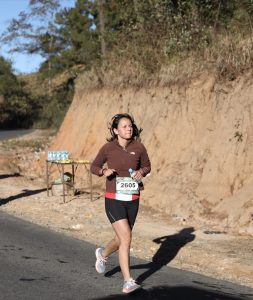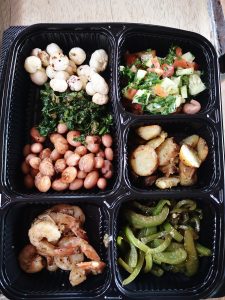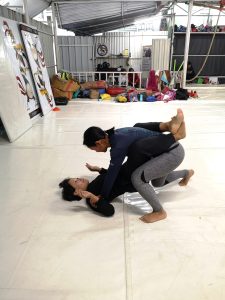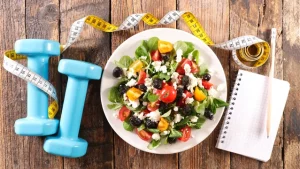 In a world with an overload of (mis)information on food, nutrition, and the enormous options in the market, one’s discernment towards making the right choice, may tend to get foggy. In such times, finding a reliable source can be life altering by simplifying the act of making better choices with regard to food towards a fit and fabulous life. Here steps in, nutrition coach, Habari Warjri, who, with her penchant for and expertise on food, exercise and wellness shares with our readers some easy dos and don’ts. Excerpts of the interview:
In a world with an overload of (mis)information on food, nutrition, and the enormous options in the market, one’s discernment towards making the right choice, may tend to get foggy. In such times, finding a reliable source can be life altering by simplifying the act of making better choices with regard to food towards a fit and fabulous life. Here steps in, nutrition coach, Habari Warjri, who, with her penchant for and expertise on food, exercise and wellness shares with our readers some easy dos and don’ts. Excerpts of the interview:
SS: Hello. You’ve been recently certified as a nutrition coach. How does it feel?
HW: Yes I recently completed a very intensive Online Course provided by Precision Nutrition, a global company based in Canada. It feels wonderful to be a finally certified nutrition coach and I am so excited to apply everything I have learnt to getting out there and helping people.
SS: How did you get to this point?
 HW: Having travelled and lived around the world I was exposed to a variety of food cultures. After I moved to Shillong I would always try to recreate different foods with available ingredients. My interest in food further intensified during Covid because it was an effort just to even find food. I ended up launching a health food store called Jatira. However, I found my true passion is in helping people and that is what led me to study nutrition to become a coach so I could make an impact in people’s lives.
HW: Having travelled and lived around the world I was exposed to a variety of food cultures. After I moved to Shillong I would always try to recreate different foods with available ingredients. My interest in food further intensified during Covid because it was an effort just to even find food. I ended up launching a health food store called Jatira. However, I found my true passion is in helping people and that is what led me to study nutrition to become a coach so I could make an impact in people’s lives.
SS: How would you describe your relationship with food and nutrition?
HW: My relationship with food has definitely evolved. When I was younger and working long hours I would use it just to satisfy hunger or some craving. My health outlook has changed from someone who was clueless about nutrition before to now being so engrossed and involved in the benefits for life it has to offer.
SS: You’ve been into sports as much as now into nutrition. How do you view their marriage?
 HW: Yes, I am a long distance runner and I have also organised many running events in Meghalaya. My interest in these simultaneously actually began when I was organizing the Mawkyrwat Ultra Run in rural South West Khasi Hills. This region is home to very strong runners and I was curious to know if their diet had anything to do with their capabilities. Their diet consisted of predominantly their home grown red rice, fish from their river streams and wild edibles foraged from their forests. This provided them most of the nutrients, vitamins and minerals needed to thrive. It was interesting to note how food besides other factors can play a role in sports performance.
HW: Yes, I am a long distance runner and I have also organised many running events in Meghalaya. My interest in these simultaneously actually began when I was organizing the Mawkyrwat Ultra Run in rural South West Khasi Hills. This region is home to very strong runners and I was curious to know if their diet had anything to do with their capabilities. Their diet consisted of predominantly their home grown red rice, fish from their river streams and wild edibles foraged from their forests. This provided them most of the nutrients, vitamins and minerals needed to thrive. It was interesting to note how food besides other factors can play a role in sports performance.
Personally, as I run and swim which requires endurance I have experimented with many different kinds of ways to fuel my workouts better but I find that whole, fresh and local foods are always the best.
SS: Over the years, many have turned to foods and food items that are imported rather than eating the local produce. What are your thoughts on this? Why does this happen and do you endorse it?
HW: In relation to my answer above, not only in rural Meghalaya but urban as well I see the predominance of junk foods taking the place of whole foods. Processed food available in packets that don’t require much effort to cook might seem convenient when pressed for time but over time these have developed into habits which in turn have led to deteriorating health.

For those looking to eat healthier and feel that expensive or imported foods are better might not always be correct. It does depend on personal preference but we have enough local produce available and all within a reasonable budget that can provide adequate nutrition for anyone who is willing to make the effort.
SS: The food, nutrition and wellness industry has seen an overhaul ever since covid and the lockdown. A lot of us have been working from home. What are some quick tips you’d suggest for them?
HW: I would advise to proceed with caution when falling for mass marketing food tactics. The food industry is using all sorts of methods to make you think you need to be eating what they are selling. I think sticking to local fruits, vegetables and meats available in your market which do not come from a packet is ideal. Take time to feel your ingredients, enjoy the process of preparing and cooking and savour every bite.
SS: Most wellness coaches vouch for selfcare through nutrition. What are some of the must haves, according to you?
HW: As a nutrition and health coach I believe adapting one’s lifestyle to prioritise oneself is important in today’s world. We get caught up in the daily grind and often get stressed.
It is important to evaluate what we eat, how we move, our quality of sleep, our relationships all in context. There is a balance that has to be obtained to be healthy in every way.
SS: As a coach, what are some food items that you eat (or don’t) everyday?
 HW: I am very active as I run, swim, lift weights and do mixed martial arts besides raising children, running a household and working. I make every effort to feed my body adequate nutrients and supplement where I feel I fall short. I eat a variety of meat, vegetables, fruits, whole grains, dairy and probiotics which I prepare myself. I eat very limited processed foods.
HW: I am very active as I run, swim, lift weights and do mixed martial arts besides raising children, running a household and working. I make every effort to feed my body adequate nutrients and supplement where I feel I fall short. I eat a variety of meat, vegetables, fruits, whole grains, dairy and probiotics which I prepare myself. I eat very limited processed foods.
SS: With the amount of information afloat online. What are some of the food fads that you disagree with?
HW: I do not agree with fad diets. There is no best diet for anyone as there is no best food or worse food. Each individual’s nutrition needs vary based on so many factors which have to be tested and tried over a period of time so no one kind of diet can be applied to anyone and be expected to be sustainable.
SS: When we talk of nutrition, we often blanket it as a category. Every age group, especially that of women, have different needs and are often left unattended. What are some of the foods you suggest for women’s health in their 30s and 40s?
HW: Yes it is correct,for women in their 30s and 40s many changes are happening in their bodies with some being premenopausal. They might have to take certain supplements but in general a diet which consists of mainly whole, fresh foods and regular exercise will help them combat any issues they might face.
SS: Over the years, snacking has become a compulsive act across age groups. What according to you are good/healthy snack options?
HW: Ideally, when one’s meals have the appropriate macronutrients in proportions there should be no craving for snacks in between meals. People snack because their meals are less satiating. If it is necessary to snack then whole and minimally processed snacks which do not have a refined flour and sugar base are good options like seasonable fruits, nuts, seeds and local foods. In the case of locally available snacks in Meghalaya some are the rice based delicacies like Putharo, Pusaw, Pusyep which are not fried then also cooked tubers like Phan Karo (Sweet Potato), Shriew (Yam) and Phan Dieng (Tapioca) are great wholesome snack options.
SS: Sugar is often deemed as the enemy in the categories of food. Do you also agree with it? If yes, why so and what are some alternatives that you’d suggest? If not, why so?
HW: Sugar is not always the enemy as our body needs sugar as well, it just has to be consumed in moderation. Most people have a problem with this because sugar is present in almost all processed foods and because the increase in consumption of such foods has skyrocketed too much sugar ends up being consumed. There are many sugar substitutes available. Some are chemically based like saccharin and aspartame. They might sound like a better option but they still cause you to crave more sweet foods and some have been linked to causing many other health conditions. I would suggest that if anyone really can’t live without sweet things then it is better they use natural sweeteners like jaggery and honey but again it means cutting out sugar from other sources.
SS: What, according to you, are some dietary must-haves for senior citizens?
HW: Senior citizens should continue to live vibrant lives and keep active doing things they love. They should focus on high-quality, nutrient -rich nutrition that helps combat health challenges at this age like inflammation and pain, poor digestion, decreased or disrupted metabolism. This could mean supplementing with Omega-3 fatty acids, adding vitamin B12, a digestive enzyme, probiotics or fiber supplements and just adjusting food quantities and getting on a regular meal schedule.
SS: Why do you think movement and nutrition have such a huge role to play not just in our physical but also our mental and emotional well-being?
HW: Exercise and eating generate endorphins which help relieve pain, reduce stress and generally improve our sense of well-being. It doesn’t take a lot of time and effort if we really put our minds to it. We should invest in our health when we can in order for us to live better quality lives going forward.
SS: Lastly, what makes you love the job that you do?
HW: I know the term Nutrition Coach sounds very vague. Like is it someone who creates strict diet plans or who gives you an exercise schedule? What I do is I work with people who need help with their health journey. It is specialized because every individual has unique goals and needs. In order for me to help them achieve those goals it involves a customised process in which I am there every step of the way to guide, motivate and resolve. I love that I can be part of someone’s journey towards positive change. To hear their stories, to be part of their challenges and to see them through to their successes.
—–End of Interview——
Sharing vital information accumulated through the years, Warjri’s take on ‘better choices’ may aid navigating through cumbersome choices that are made easy and prevent alienating foods or food categories that may or may not necessarily be enemies but only paying attention to their quantities and qualities that may make all the difference.
(Interviewed by Esha Chaudhuri)
Habari Warjri (44) has an educational background in business from New York City, has previously worked in Investment Banking until 2008 before moving to Shillong. Married and mother of two, Warjri has recently been certified as Nutrition and Health Coach by Precision Nutrition, Canada and lives by the motto ‘Eat, Move & Live Better’.



